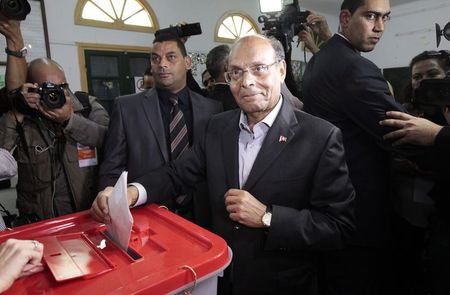By Tarek Amara
TUNIS (Reuters) - An official under former hardline ruler Zine el-Abidine Ben Ali appears set for a close run-off in Tunisian presidential polls with a rival who says he represents the 2011 "Arab Spring" uprising that toppled him.
Preliminary results in the country's first presidential ballot since the uprising are expected later on Monday. But the parties of two frontrunners said initial tallies showed they would face off in next month's second round.
The presidential poll is a step in Tunisia's sometimes rocky transition since its uprising prompted the overthrow of long-ruling leaders in Yemen, Libya, Egypt and Syria. Tunisia's progress and political compromise between rival Islamist and secular rivals contrasts with warring factions in Libya and the army overthrow of an elected Islamist president in Egypt.
One frontrunner, Beji Caid Essebsi, who was parliament chief under Ben Ali, has cast himself as a veteran technocrat. He will face off with Moncef Marzouki, the current president who has warned against return of "one-party era" figures like Essebsi.
The run-off will likely be tough with both candidates hunting for backing from the liberal, left-wing and Islamist parties that emerged after the end of Ben Ali's one-party rule in one of the Arab world's most secular nations.
Essebsi and other former Ben Ali officials say they are not tainted by the abuses of the past administration.
He says he will be looking to consolidate his secular Nidaa Tounes party's win in last month's parliament elections when they beat Islamist Ennahda party into second place. Ennahda won the first election after the 2011 revolt.
"This confirms our win in the parliamentary vote, and that gives us more confidence about the second round," Lazhar Akremi, a Nidaa leader. "It's too early to say who will side with us, but we are reaching out to all Tunisians."
Marzouki, a former rights activist, has called the election a race to stop the return of the old regime. On Sunday after the poll he challenged Essebsi to a televised debate as part of his campaign to "beat the old regime machine".
Votes of Ennahda supporters will play a key role in the second round as the Islamist party positions itself for a part in the new government formation or as the main opposition. It has so far backed no presidential candidate.

(Story refiles to introduce dropped reference to Tunisia in lead)
(Writing by Patrick Markey; editing by Ralph Boulton)